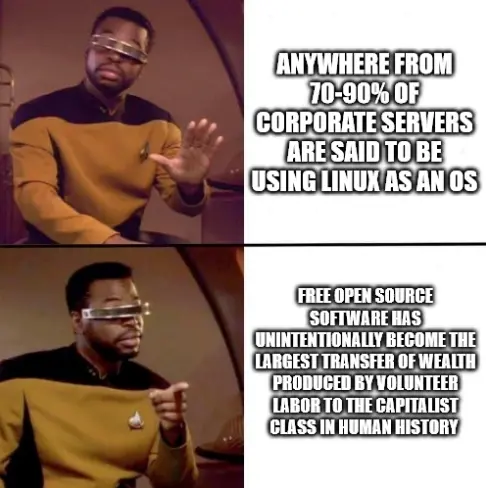Mina
meena@cathode.church@yogthos given that Open Source was intentionally capitalist, and Free Software has repeatedly failed to position itself as anti-capitalist, I'm not sure this is a bug in those system…
sofia ☮️🏴
sofia@chaos.social@yogthos well, it makes about as much sense as thinking that unlicensed copying is stealing…
i guess it would also mean that public goods are impossible.
moved to tech.lgbt
wolfger@penguicon.social@yogthos Having dealt with the corporate world, they actually are somewhat averse to free-as-in-beer software, paying Linux distros such as Red Hat and Ubnuntu for supported systems. Still, it's a valid point that many programmers donated free labor to the profit of others.
Aaron
aaron@chirp.zadzmo.org@yogthos I think a nonzero amount of this, is that talent dried up in the paid-for sector.
Solaris was huge in the early days of the web; but all the "cool kids" ran Linux at home. It got harder and harder to find sysadmins skilled with Solaris, whereas Linux experience was everywhere.
Because of this, the Linux admins were cheaper to hire.
Software licensing isn't the biggest IT budget item anymore, salary is.
ocdtrekkie
ocdtrekkie@mastodon.social@yogthos And FOSS enthusiasts *lose their minds* if you suggest maybe a noncommercial license is okay.
Neel Chauhan
neel@neelc.org@yogthos 70-90% of WEB SERVERS run linux. so many corporate servers run windows but are behind intranets.
I bought a few HPE servers new, and guess what: they all had a windows boot manager entry.
It's also that linux is the choice of load balancer, even at MSFT: netcraft shows microsoft.com as running linux. They may in fact be running windows, or maybe freebsd (e.g. 4chan/HN).
Disclaimer: I work at microsoft but not windows or azure.
Emacsen
emacsen@emacsen.netUsing Free Software in commercial applications is a thing, but it's not a theft or transfer of assets, because software is zero marginal cost. The inverse of this argument was made by Microsoft in the 1990s arguing why government use of FLOSS was bad for the American economy.
I worked as a sys-admin for the government for over a decade and our use of Free Software saved the taxpayers enormous amounts of money.
Yogthos
yogthos@mas.to@meena FSF has been explicitly anti-capitalist and this is the whole reason GPL was shunned by companies, then the corporate world started making a big push for permissive licenses that allowed companies to freeload
Yogthos
yogthos@mas.to@sofia the issue is with freeloading, pirating content and then selling it is equally morally wrong
amiloradovsky@stereophonic.space
amiloradovsky@stereophonic.spaceI wonder how their huge brains ever fit in their apparently normal skulls~
Lars Marowsky-Brée 😷
larsmb@mastodon.online@yogthos I dislike with this framing not because it is inaccurate but because it robs me of the last vestige of purpose
Jonathan Corbet
corbetI'm not entirely fond of how free software has become, to many, a way to shed maintenance costs. There are a lot of problems with how things work. But the situation is not quite as portrayed in this cute little image, IMO.
Yogthos
yogthos@mas.to@corbet Linux kernel was doing just fine before corporations got involved, and obviously companies aren't contributing out of altruism.
Companies contribute because it's cheaper than using a commercial product.
The other aspect here is that companies now have influence over projects like the Linux kernel and influence their evolution.
Jonathan Corbet
corbetNo, it's not altruism on their part, but does that matter?
Anyway, I was challenging the assertion that free software is a transfer of wealth from volunteers to companies; I don't think you've said anything to change minds on that.
ArneBab
ArneBab@rollenspiel.social@yogthos "unintentionally" as in: the #copyleft of the #GPL does not have teeth when it’s just used on a server, and too few people chose the #AGPL to preserve copyleft.
See what Google has to say about it: https://opensource.google/documentation/reference/using/agpl-policy
AGPL has been available since 2002: https://en.wikipedia.org/wiki/Affero_General_Public_License
Diego Elio Pettenò
flameeyes@mastodon.social@Jummit @ArneBab @yogthos that also means that nobody working there can ever contribute to it either.
Take that into account.
https://flameeyes.blog/2020/04/16/making-it-easy-to-contribute-code/
@flameeyes @ArneBab @yogthos Interesting. That is one downside, although it does protect you from the embrace-extend-extinguish cycle.


